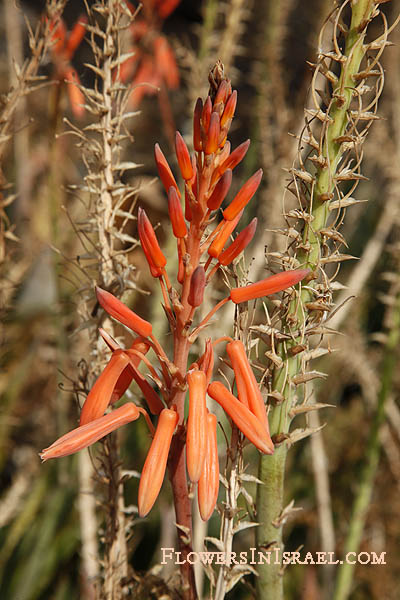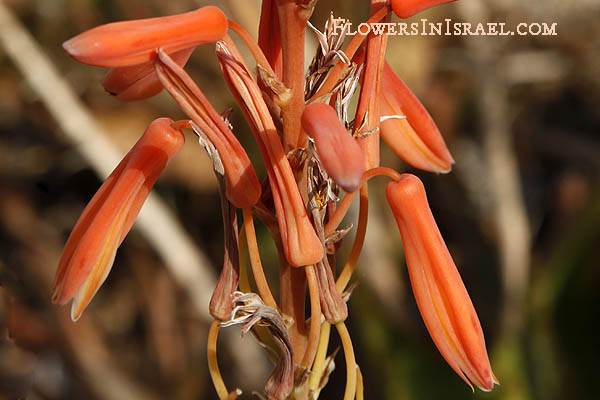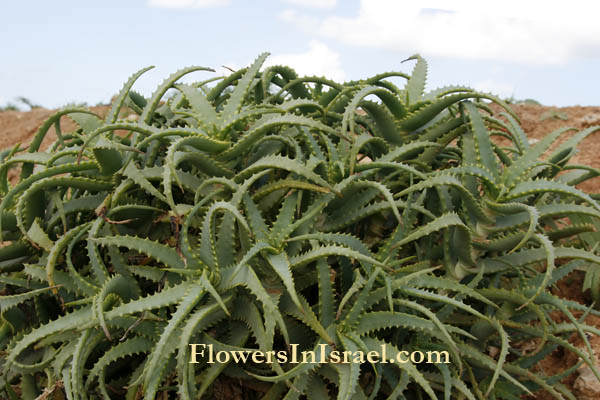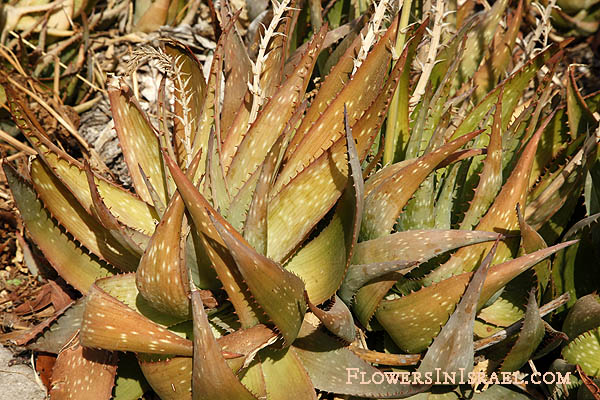
Derivation of the botanical name:
Derivation of the botanical name:
Aloe, from the Greek alsos and refers to the bitter juice from the leaves. This name probably derives either from the Arabic alloeh or the Hebrew allal, both meaning 'bitter.'
vera, "true or genuine".
vulgaris, "common".
barbadensis, from or of Barbados.
The Hebrew word אלוי, alvay, have been borrowed from Greek or Latin back into Hebrew.
- The standard author abbreviation L. is used to indicate Carl Linnaeus (1707 – 1778), a Swedish botanist, physician, and zoologist, the father of modern taxonomy.
- The standard author abbreviation Burm. is used to indicate Johannes Burman (1707 – 1779), a Dutch botanist and physician.
Aloes (a species in the Liliaceae family) have six stamens , and one style, so Linnaeus ranged this plant in the sixth class, called hexandria monogynia.
It was probably used like galbanum, for fixing the more fading scents.
Aloe was first discovered on a Mesopotamian clay tablet dating from 2100 BCE.
- The first detailed description of aloes is probably in the Ebers Papyrus, written around 1550 BCE. The description gives twelve formulas for mixing aloe with other factors to treat both internal and external human disorders. Aloe Vera was used to treat worms, relieves headaches, soothes chest pains, burns, ulcers, skin disease, allergies, and to 'expel catarrh from the nose' (Eb 63),
- The Egyptian Book of Remedies (ca. 1550 BCE) notes the use of aloe in curing infections, treating the skin, and preparing drugs that were chiefly used as laxatives.
- Legend has it that the natural juice of the aloe plant was used by Cleopatra and Nefertiti for both skin and hair care.
- Herodotus (ca.484-425 BCE), Greek historian, said that the Egyptians used it for embalming dead bodies.
- Aloe was known to the Greeks, for Alexander the Great (356-323 BCE) is said to have been instructed to conquer the island of Socotra
between Somalia and Hadramout where the plants grew.
- In the Bible the plant was known as ahaloth and it was used as a perfuming agent: Nicodemus brought it mingled with myrrh, to embalm Jesus,
"Nicodemus brought a mixture of myrrh and aloes, about seventy-five pounds.
Taking Jesus' body, the two of them wrapped it, with the spices, in strips of linen.
This was in accordance with Jewish burial customs."
John 19:39-40
- Dioscorides (ca. 40-ca. 90), Greek physician, wrote of Aloe for constipation, burns and kidney ailments.
- Pliny the Elder (23-79 CE), Book XXII:14, "The nature of an aloe is bracing, astringent, and gently warming. There are many uses for it, but the chief is to relax the bowels, for it is almost the only laxative that is also a stomach tonic, no ill effects whatever resulting from its use."
Pliny continues that it prevents the hair from falling out; it relieves headache; all eye troubles are cured, for marks and bruises; for diseased tonsils or gums, for all sores in the moutgh, and for spitting of blood. It is also sprinkled on ulcerated male genitials.
- Prospero Alpini(1553-1617), an Italian physician and botanist, relates that Egyptian women of his day perfumed their private parts with it and that the wood was used in composite remedies to treat fever and plague.
- Napoleon's wife Joséphine de Beauharnais (1763-1814) used a milk / aloe gel lotion for her skin. Her recipe is a ¼ cup aloe vera gel mixed with 1 tablespoons of fresh whole milk.
- H.B.Tristram,The Natural History of the Bible (1880): "The 'Aloes' of Scripture has nothing to do with the Aloes of medicine."
The aloes of the Old Testament, are thought to be different from those of the New Testament.
The Aloes of the Old Testament (Numbers 24:6; Psalms 45:8; Proverbs 7:17; and Song of Solomon 4:14) and of the Hebrew Bible (ahalim and ahaloth in Hebrew) are believed to be agarwood from Aquilaria malaccensis, Aquilaria agallocha, a species in the Thymelaeaceae family, also known as "lign aloes", found in Bangladesh, Bhutan, India, Indonesia, Malaysia, Myanmar, the Philippines, Singapore and Thailand.
Bible resources:
- Numbers 24:6
“Like valleys they spread out, like gardens beside a river, like aloes planted by the LORD, like cedars beside the waters.
- Psalm 45:8
All your robes are fragrant with myrrh and aloes and cassia; from palaces adorned with ivory the music of the strings makes you glad.
- Proverbs 7:17
I have perfumed my bed with myrrh, aloes and cinnamon.
- Song of Solomon 4:14
nard and saffron, calamus and cinnamon, with every kind of incense tree, with myrrh and aloes and all the finest spices.)
- John 19:39
He was accompanied by Nicodemus, the man who earlier had visited Jesus at night. Nicodemus brought a mixture of myrrh and aloes, about seventy-five pounds.


|



